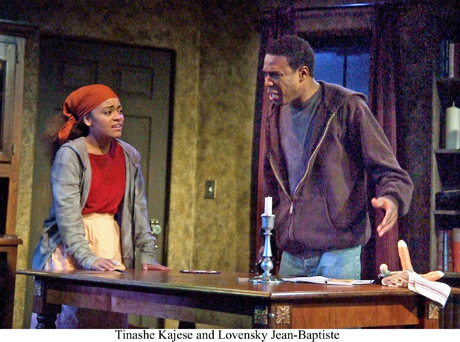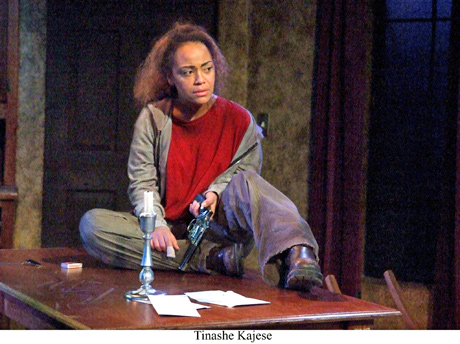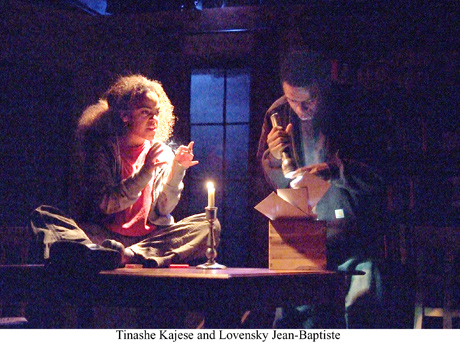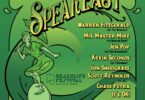Hope springs eternal even if the well is…well, running dry. South African playwright Athol Fugard’s latest play “Victory” premiering at the Fountain Theatre reveals the tenuous emotions of resentment and bitterness that lie just beneath the surface of a post apartheid South Africa struggling to find its identity.
Post Apartheid Playwright
With his latest play, Fugard also redefines his identity as a post apartheid playwright. For fifty years, Fugard’s works have marked the evolution of South Africa’s political minefield. One of the most vocal opponents of apartheid, Fugard’s earlier plays such as “Blood Knot” “Sizwe Banzi is Dead” and “The Island” endured censorship and eventually overseas performances for his challenges against injustice and segregation. The end of apartheid may have signaled an end to Fugard’s life work and although the playwright maintains he is a storyteller first, and a political pundit second, Fugard has successfully managed to bridge the past and present in his own work while revealing the conflict between the two which lies at the heart of South Africa’s instability.
“Valley Song” & “Victory”
It’s been thirteen years since Fugard stood in line waiting to cast his vote in the country’s first ever free and democratic election. This experience inspired “Valley Song” similar to “Victory” in its dynamics and both based on personal experiences. The optimism in “Valley Song” however is subdued by the harsh realties of the present in “Victory.”
Both plays center on a young woman seeking independence and a better life. In “Valley Song” Veronica seeks opportunity with determination and boundless hope that a better life will be available to her. In “Victory” Victoria [Vicky] seizes opportunity through theft and desperation because a better life is not possible. Over a decade separates these characters, and while their desires are the same, the ability to achieve them is not.
Wrecking Ball
Vicky (Tinashe Kajese) named after the ‘Victory Day’ of Nelson Mandela’s release from prison, enlists the aid of her friend Freddie (Lovensky Jean-Baptiste) a hardened petty criminal to steal a wad of cash from her mother’s former employer and family friend Lionel (Morlan Higgins). They break into the home only to discover that the cash Vicky assumed was there is nowhere to be found. Vicky is adamant that it has to be somewhere as Freddie loots the comfortable home that is more of a library than a living space. He urinates on the books and threatens Vicky who has begun to regret her decision, but cannot undo the events already set in motion.
Hard to Understand
As she pleads with Freddie, Lionel enters packing a pistol that is more symbolic a gesture than a real threat. He is horrified to discover Vicky’s betrayal, and this combined with his already bleak disillusionment and bitter grief over his dead wife is the final straw that breaks his heart. The fight is already lost even before Freddie snatches the gun from Lionel. The shift in power is obvious with Freddie stating, “Whoever holds the gun has the power.” Lionel does not seem to care, as he begs for them to explain why, “All I want is to understand.”
The dialogue between Freddie and Lionel while Vicky plays servant to her new “Master Freddie” cooking him dinner and acting demonstratively submissive paints a bleak picture of the growing resentment of the past that fuels the hostility in the present. It is classic Fugard at his finest, although perhaps far more despondent in the futility of reaching an understanding for both sides.
Privilege and Power
Lionel is sickened by Freddie’s machismo towards Vicky and cautions about the double-edge sword of privilege and abuse of power. Freddie isn’t buying it, and in fact quite enjoys his new position that without the gun would be impossible to achieve. It is the threat of violence that forces a dialogue between these two men from seemingly opposite sides of the fence. Freddie accuses Lionel of hypocrisy for wanting to further Vicky’s education even though the retired schoolteacher taught only, “Nice, white, schoolboys.”
Power Play
The past and the present are forced in a showdown across the kitchen table, across the scattered, desecrated books (particularly Tolstoy’s ‘Resurrection’ – a philosophical narrative about forgiveness) and broken picture frames. The future hopes and frustrations in Vicky are caught between the power play as she tries to appease both men and her needs which cannot be met by one or the other.
Apartheid Sentiment
There is nothing worse than indifference. Lionel cannot be bothered to care anymore, and it is this feeling that has kept apartheid raging even after its official abolishment. Freddie can only live in the present, and Vicky, raised by the past in posh surroundings by Lionel and his wife, now lives with her alcoholic father in squalor.
“You get to wake up every morning and see your flowers in the garden. I wake up…and look out a dirty window to see a hungry dog in the street….There is no hope in a matchbox.”
Vicky reminds Lionel about the times she asked for help and money. “But you didn’t believe me. I could see it in your eyes.” Lionel is shattered. His only defense is grief and self-pity for his dead wife, but Vicky’s desperation is much worse than poverty and lack of opportunity. Her drunken father mistakes her for her dead mother one night and tries to molest her. She runs from her home to Lionel’s house knocking all day for him to let her in. Lionel blusters but Vicky tells him, “I saw you…I saw your shadow as you were moving about in the window.”
Haunted by the Past
It is this final act of betrayal and indifference from Lionel that sets in motion the plan to rob him. Vicky lies to Freddie, claiming that it was Lionel who tried to force himself on her instead of her father who is “demonized” by the ghost of her mother. It is interesting to note that both older patriarchs have lost their wives and use grief as an excuse and a tool for abuse, mental and physical. The will to live is replaced by sorrow and the ghosts of the past in their wives serve to victimize Vicky in the present.
What Now?
Any hope for the future is shattered in a rather predictable end. The dialogue towards understanding is interrupted by the struggle for power. Violence it seems always has the last word.
Director and Cast
Stephen Sachs, (who directed Fugard’s “Exits and Entrances” in 2004 also starring Morlan Higgins and “The Road to Mecca”), lends an otherwise vicious night at the theatre sensitivity and moments of calm before the storm. The play runs only 75 minutes without any intermission, but Sachs keeps the pace from feeling too brisk without milking it. Veteran Morlan Higgins gives Lionel heart underneath his somnambulist shuffling and broken spirit. Tinashe Kajese as Vicky simmers and crackles in an electrifying performance that sends shockwaves of emotions. Lovensky Jean-Baptiste plays Freddie with a mercurial confidence that is both chilling and droll.
Too Soon Victory
The present problems have reached a status quo until either the past is exorcised which seems unlikely and impossible, or is forced to listen. The future is in a state of suspension until there is absolution. Somewhere between these unresolved perspectives, Fugard offers a glimmer of hope even if for right now it’s in a matchbox.
U.S. Premiere of “Victory” by Athol Fugard
Runs through March 9
The Fountain Theatre
5060 Fountain Ave.
(Fountain and Normandie)
323-663-1525
www.fountaintheatre.com











